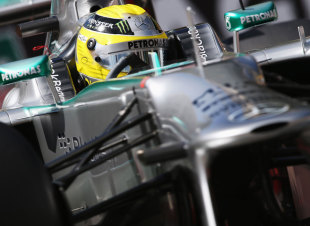
Formula One is about taking risks. Just ask any of the 22 drivers that competed in the Monaco Grand Prix last weekend. The rewards can be huge, but as several of the competitors proved over the weekend, risks can also be costly.
Quite why Mercedes decided to risk testing Pirelli tyres after the Spanish Grand Prix without telling the other teams, therefore, is a bit of a mystery. In undertaking the test it must have been aware that the other teams would take issue with it, yet it went ahead anyway. The mudslinging has already started with Red Bull claiming the test was conducted in an "underhand" way, and for a company that is essentially in the sport to sell road cars, a public row over whether it has broken the regulations is not good PR.
So Mercedes must believe the test was permissible under Pirelli's contract with the FIA and it has likely consulted its lawyers to make sure it can defend itself. Otherwise the risk is simply not worth the reward, which Toto Wolff claimed was minimal as it did not test new parts or know which tyres they were using. But don't be fooled into thinking that Mercedes took part in the test simply to help Pirelli. There is no doubt it will have learned quite a lot at the Circuit de Catalunya, because if Mercedes came away from three days of testing in Barcelona none the wiser then its engineers were not doing their job properly.
However, it's worth stating that whatever they did learn will have had no real impact on helping Nico Rosberg to victory in Monaco. Rosberg won by controlling the pace and forcing the cars behind into one-stop strategies (which later became an effective two-stop with the red flag). In order to preserve tyres, the cars never got close to exploiting their true performance on Sunday - as was evident in the first stint when the leaders were up to eight seconds off the qualifying pace. It was purely strategy that won the race for Rosberg, not the test the previous week. What's more, anything Mercedes did learn on the high-speed Circuit de Catalunya using Pirelli's development tyres will not have related to the super-softs and softs used on the streets of Monaco.
So the case Mercedes has to answer is whether Pirelli's contractual right to complete 1000km of testing in a contemporary car outweighs the article in the Sporting Regulations that bans in-season testing. The FIA's press officer sent a note to the media on Sunday evening explaining that the governing body had talked to Pirelli about a test at the start of the month, but one of the conditions was that all the teams were offered the opportunity to take part.
Pirelli wrote to the teams early last year about the possibility of such a test and heard back from some but not others. However, the FIA did not receive confirmation that all the teams were contacted ahead of the Mercedes test and rival teams have made clear they knew nothing about it. If that is the case the Mercedes lawyers could face some difficult questions when the case goes in front of the FIA's International Tribunal. Presumably they have some answers to those questions because without them the risk simply does not match the reward.
Laurence Edmondson is deputy editor of ESPNF1
© ESPN Sports Media Ltd.
 Laurence Edmondson is deputy editor of ESPNF1 Laurence Edmondson grew up on a Sunday afternoon diet of Ayrton Senna and Nigel Mansell and first stepped in the paddock as a Bridgestone competition finalist in 2005. He worked for ITV-F1 after graduating from university and has been ESPNF1's deputy editor since 2010
Laurence Edmondson is deputy editor of ESPNF1 Laurence Edmondson grew up on a Sunday afternoon diet of Ayrton Senna and Nigel Mansell and first stepped in the paddock as a Bridgestone competition finalist in 2005. He worked for ITV-F1 after graduating from university and has been ESPNF1's deputy editor since 2010

